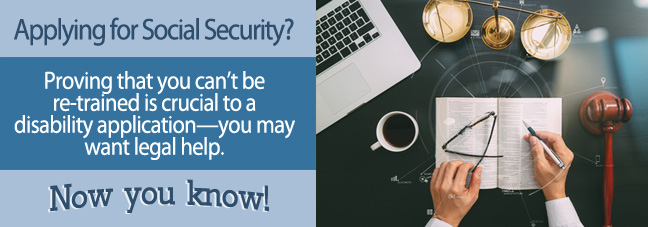To be eligible for Social Security Disability benefits, you must prove that you are unable to engage in substantial gainful activity (SGA). More specifically, the Social Security Administration (SSA) will want to know that you are unable to earn more than $1,550 per month at any job in which you are “qualified for.”
This means that while your disability may prohibit you from performing at your most recent place of employment, you may have skills that can be used for another job.
Upon applying for Social Security Disability benefits, one of the factors that will be examined is your ability to do another job, also called your “transferability of skills.”
For purposes of classification, the SSA defines a particular position as “unskilled,” “semi-skilled,” or “skilled.” If you have previously worked in a job that is determined to be semi-skilled or skilled, the SSA will decide whether or not you have skills that could be used in another job or occupation.
By evaluating your past work history, your skills, and your education, the SSA will determine your transferability of skills.
If it is determined that you have transferable skills that could allow you to engage in SGA and that you are capable of working, it is highly unlikely that you will be approved for SSDI benefits.
However, depending on your condition, learning a new job may prove to be impossible. If you are applying for Social Security disability benefits in the first place, the odds are high that you can barely keep up with working as it is, never mind learning a new job.

How Do My Medical Limitations Affect My Transferrable Skills?
When determining your transferability of skills, the SSA takes into account the impact that your disability might have on the continued use of your skills.
For example, while you may have worked as a bookkeeper in the past, if your current condition does not allow you to move files or hold a pen, working in an office may not be an option for you.
Additionally, if your current condition impacts your mental functioning, this may also prohibit you from learning a new job.
For example, if you were once a nurse, but your new onset anxiety as a result of your cardiac condition makes it impossible for you to care for patients, this will be considered in your transferable skills.
The Residual Functional Capacity (RFC) plays a vital role in determining your work abilities. It essential that your RFC accurately reflects your limitations.
Does Age Impact The Likelihood of Being Approved?
As a general rule, the younger you are, the more likely it becomes that you will be expected to retrain for a job that you are capable of performing. Typically, the younger someone is, the higher one’s ability to acquire new skills and adjust to a new job environment.
The SSA does not expect that individuals who are approaching advanced age have the same capacity to learn several new skills as a younger applicant.
Once you have hit the age of 50, the SSA relies on medical-vocational “grid rules” to determine if you will qualify for disability benefits.
For those applicants who don’t meet a medical listing in the Social Security “Blue Book,” the SSA will utilize “grid-rules” to determine disability eligibility.
These grids take into account age, educational level, skills, and RFC levels in their determinations.
Can I Get Help To Prove I Can't Be Re-Trained?
Hiring a disability attorney or advocate who has experience in the field can prove to be very beneficial for your case. For example, the SSA will likely have a vocational expert testify at your disability appeals hearing.
This person will speak to the current job market as it relates to your transferable skills. An experienced attorney will have an opportunity to cross-examine the vocational expert, and possibly provide you with better odds of winning your claim.